Our Excel Curriculum

‘We are a small school dreaming big.’
Blowers Green Primary Moral Purpose
To enrich and enhance pupil’s learning and life experiences, enabling every child to develop a love of learning and achieve outstanding progress and attainment.
Our EXCEL Curriculum Vision
At Blowers Green Primary School we want our children to be the best that they can be. This reflects our passionate commitment to learning, driven by our five Trust Values which are at the centre of everything we do. The values underpin our teaching and learning, providing a caring and supportive environment within which our children our surrounded by excellence.
The school’s EXCEL curriculum is underpinned by the National Curriculum but goes beyond it by offering a curriculum that is ambitious, inspiring, creative and innovative; one that develops the whole child, encouraging and challenging them to achieve their full potential; providing them with the skills, knowledge and understanding to become valued citizens of the future.
About the EXCEL Curriculum
The EXCEL Curriculum at Blowers Green Primary has been developed by leaders and staff in our school, most of whom are subject specialists. Grounded in research, the curriculum has been refined to ensure that the content remains ambitious, challenging and exciting for all pupils. A continuous cycle of review is undertaken to evaluate previous learning. This powerful cycle of collaboration ensures that curriculum development and subject knowledge is the heartbeat of the school.
Our curriculum is progressive and sequential and it has been designed to ensure our children know more, remember more and can do more as they move through school. Our curriculum is highly aspirational and challenges all children to Dream Big. Learning that Inspires will challenge our children to imagine possibilities beyond their own experience, develop their creativity and believe that they can achieve regardless of their background. Above all, our curriculum is designed to help every single child to be the best they can be in all areas of their lives.
EXCEL Curriculum Overviews
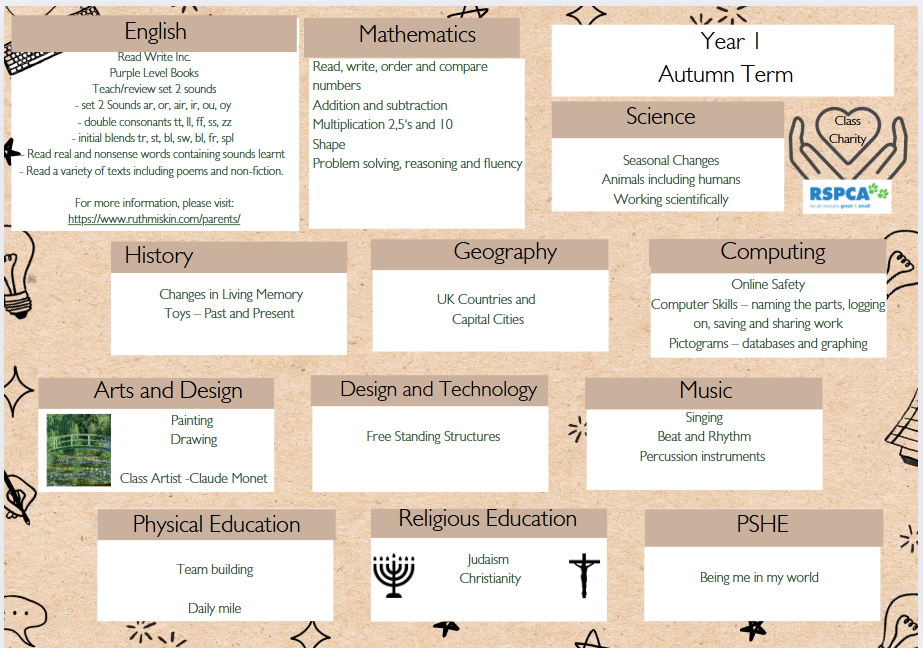
Above is an example of an EXCEL Curriculum overview.
The quality of the curriculum planning is strong, clear and progressive. Long term maps and very well sequenced medium term plans with challenging end points and activities are ambitious and go beyond the National Curriculum. High expectations for all, including most able and SEND, permeate all that we do.
What does our planning look like?
Our long term plans or ‘road maps’ summarise the end-point knowledge children will learn in each subject.
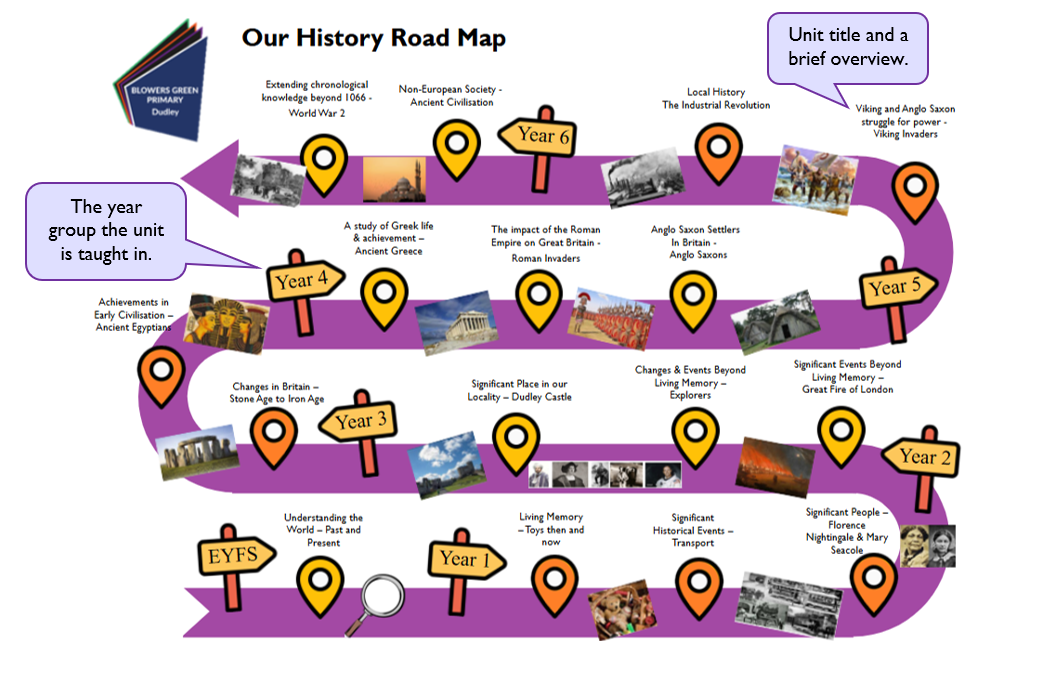
Our subject plans build on our long-term plans and involve more detailed planning of the teaching sequence for how our children will learn the end-point knowledge and skills required for each unit. The knowledge and skills are depicted by the National Curriculum as well as our key curriculum concepts that thread through the units delivered in each subject. Consideration has been given to the order of when content is taught, so that there is progression. For example, in history, British history units are taught chronologically. In art and design, the teaching of drawing begins with children in the Early Years experimenting with a range of tools to represent a face as a drawn circle with marks for features through to manipulating tone, line and pattern in Year 6 to show emotions through detailed sketching. Activities are planned to help develop pupils’ knowledge and challenge their thinking.
All subjects are taught discretely. Effective curriculum planning is in place for all subjects.
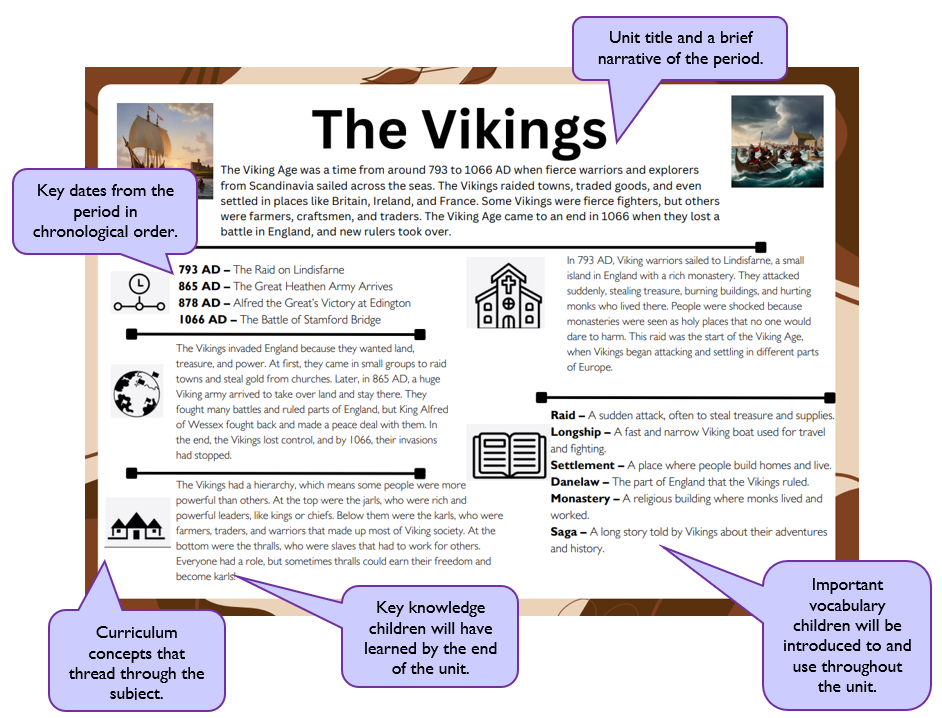
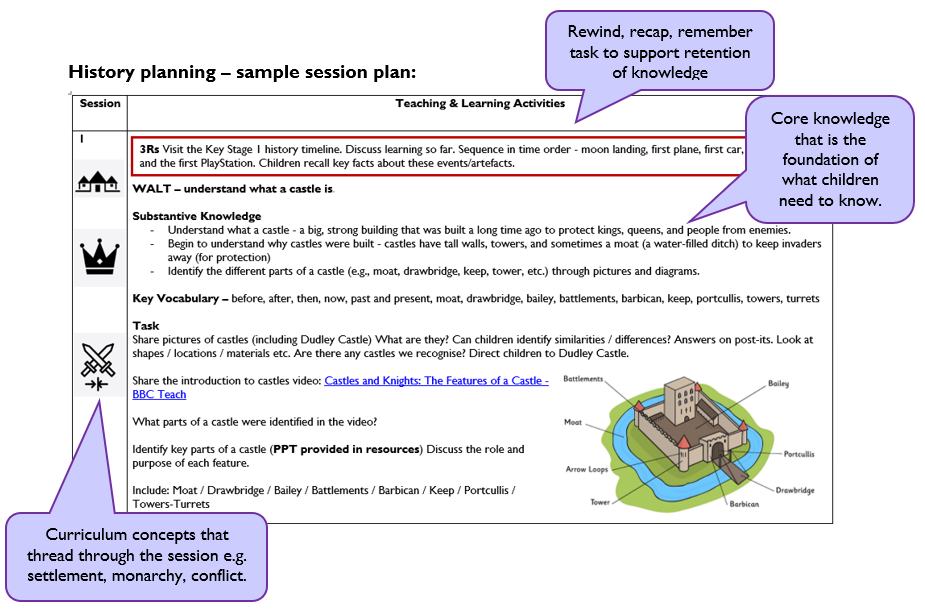

How are knowledge organisers used?
“The most powerful tool in the arsenal of the curriculum designer is the knowledge organiser. These organise all the most vital, useful and powerful knowledge on a single page.”
- Mary Myatt, Curriculum and Knowledge Organisers.
Knowledge organisers are in place for each of the EXCEL subject units. They make knowledge and language explicit, supporting planning, teaching and assessment to help our children know more, remember more and do more.
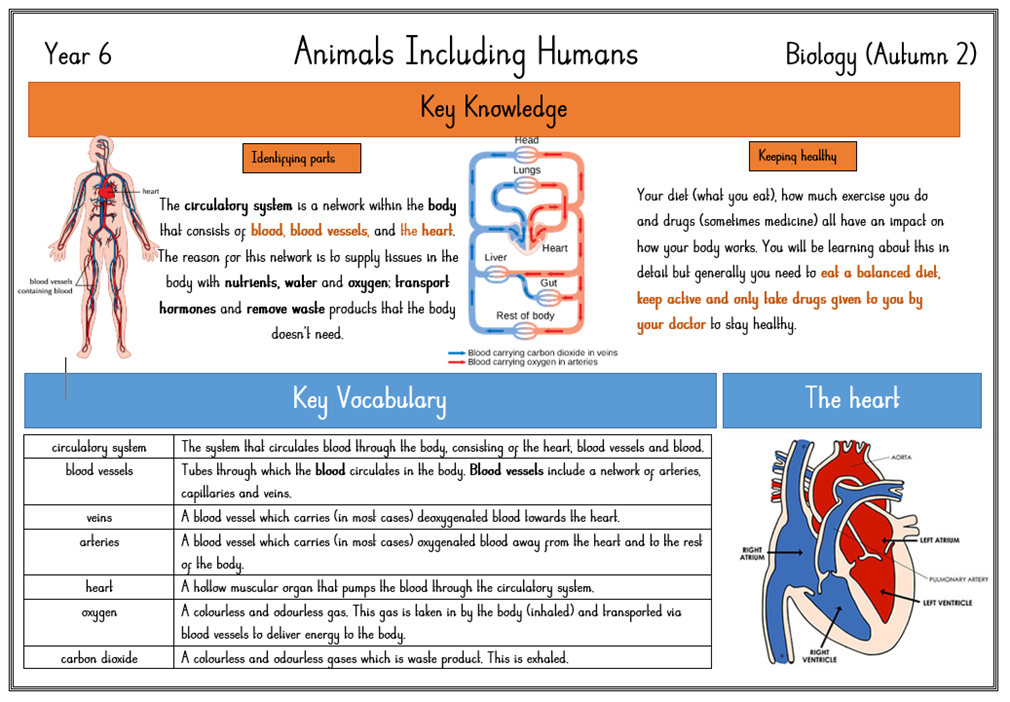
Each knowledge organiser is a summary of the key facts and essential knowledge that children require and will learn about for each of their foundations subjects for the year. They have been put together by subject leaders, and we are delighted to be able to give each child an individual copy. The expectations around the Knowledge Organiser are similar to those of the Learning Journal. They need to be present for every lesson; therefore, children need to ensure they are in their bags every day. As a parent, they will give you a summary insight into what your child will be studying throughout the year and, therefore, enable you to support them further at home.
How will the curriculum be implemented?
Our academically rigorous curriculum is designed to enable learners to acquire relevant subject knowledge which underpins the application of skills. The acquisition of knowledge and the development of skills is carefully and progressively mapped across each year group and subject area to create a purposeful and exciting learning journey for every child within a stimulating and challenging learning environment. Our curriculum intent will be implemented through engaging and enthusing children through Learning that Inspires every lesson, every day.
Teachers have a secure knowledge of the subjects they teach; with many subjects in school being led by teachers who are specialists in the area. Support is provided through clear strategic planning, a programme of CPD and effective support from leaders. We engage in a constant cycle of review and evaluation.
Subjects are taught discretely to maintain integrity; however, there are regular opportunities for interconnectedness as teachers plan for all children to make curricular links within and between subjects. Stimulating and purposeful activities and high-quality teaching resources engage children and ensure that they achieve well. The lessons promote deeper thinking through key questions and regular opportunities to review and revisit learning to aid with retention of knowledge over time. Key concepts underpin the ideas we want pupils to grasp and these are reinforced through different content which allows children to apply their learning in a range of contexts in lessons and throughout their day because every second counts.
Our teaching and learning methods ensure that the curriculum is delivered effectively so that all children make progress regardless of background and ability.
How are the key concepts mapped?
The road map for agriculture in the history curriculum shows how the concept develops progressively from EYFS to Year 6, building on key ideas as children’s understanding deepens. Starting with basic concepts of nature and farming in the early years, it weaves in more complex topics like the history of agriculture, farming techniques, and the impact of agriculture on society, ensuring that by Year 6, students have a well-rounded understanding of its historical significance. This approach ensures the accumulation of substantive knowledge over time, allowing students to make connections between the past and present.
The key concept of agriculture
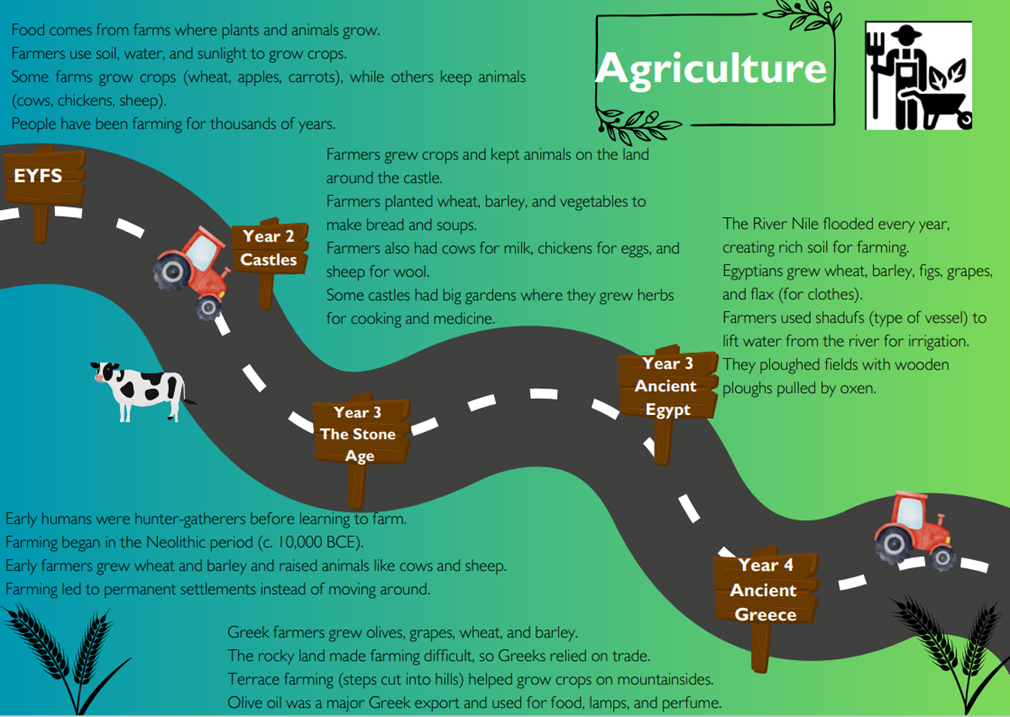
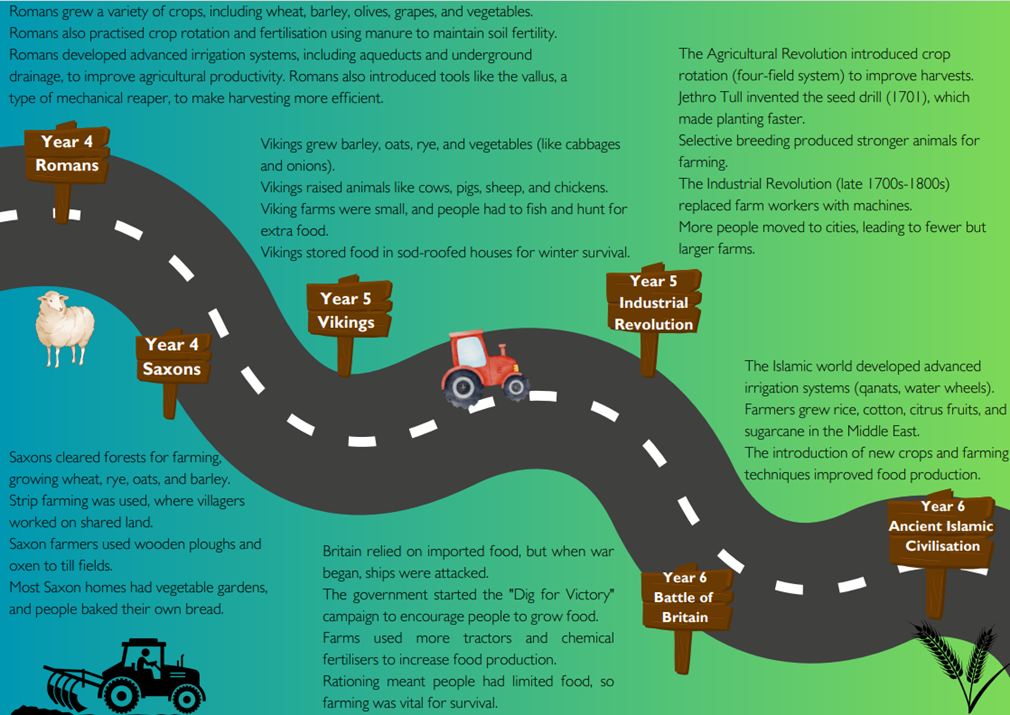
Statement of Impact
Our children leave us with a broad, rich and deep knowledge of the curriculum studied, mastering skills and retaining knowledge so that they are well prepared for the next stage of their education. At the end of each key stage, the vast majority of pupils remember the content taught and are fluent in it, with some pupils having a greater understanding. Children leave us as citizens of the future, able to make a positive contribution to our society and the wider world, drawing on their experiences and building on the foundations built during their time at our school.
Formative assessments are used as ongoing assessment tool. These opportunities throughout the lesson allow teachers to identify gaps in knowledge, misconceptions and where knowledge may not be embedded. Teachers use in the moment feedback and adaptations to planning to address these as they arise.
SEND children are assessed in the same way however their barriers are removed. For example, if a child’s specific needs relate to writing, they may have a scribe/multiple choice to help them answer the same questions as the other children. At the start of a new lesson, pre-teaching is used to bring previous knowledge and learning to mind for those pupils who have retention issues to reduce cognitive load. Where appropriate, knowledge notes may also be adapted to ensure the core knowledge is the focus.
We measure the impact of our curriculum in the following ways:
- The quality of standards achieved against the planned outcomes.
- A celebration of learning each week - involving a phone call home, VIPs, pupil postcards.
- Pupil voice – pupil discussions about their learning.
- Vocabulary expectations.
- 3Rs tasks – Rewind, recap, remember.
- Independent learning carried out by children, beyond lessons – challenges.
- Assessment of the retention and recall of substantive knowledge.